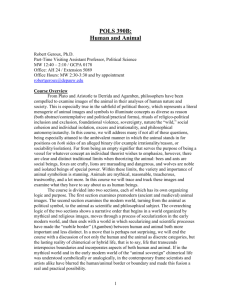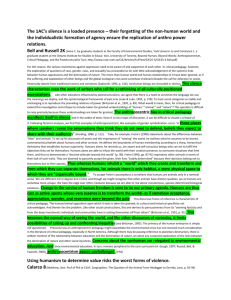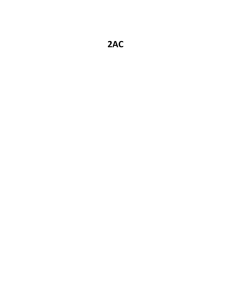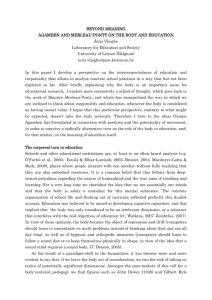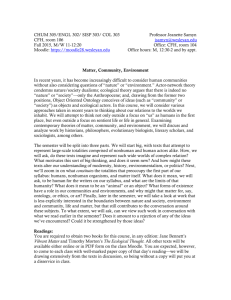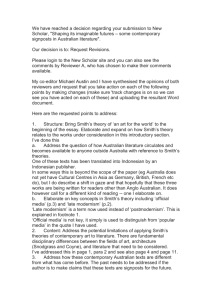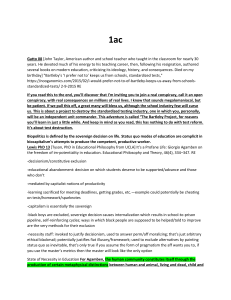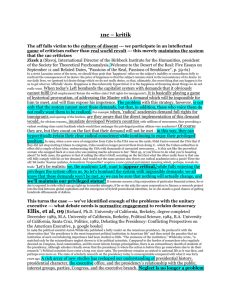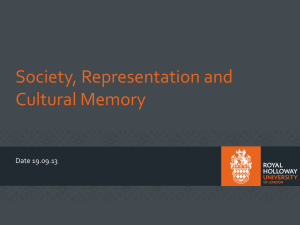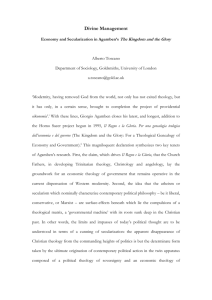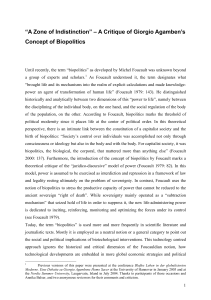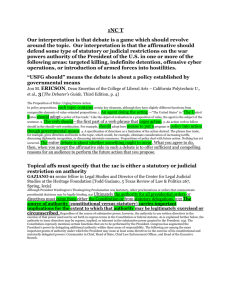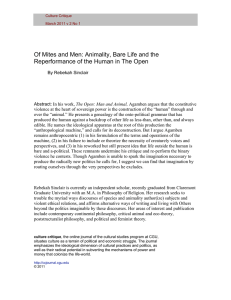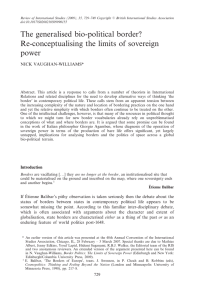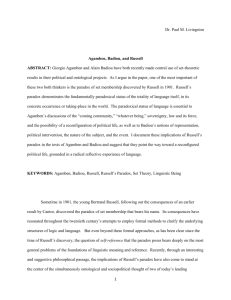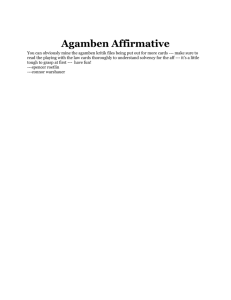View/Open
advertisement
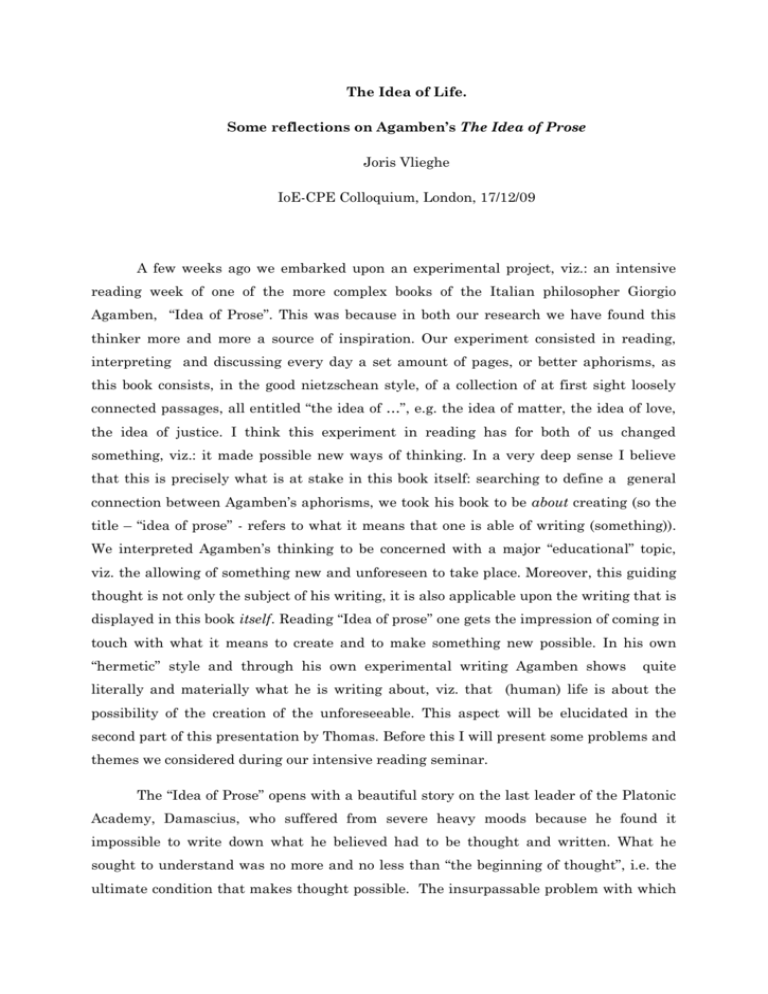
The Idea of Life. Some reflections on Agamben’s The Idea of Prose Joris Vlieghe IoE-CPE Colloquium, London, 17/12/09 A few weeks ago we embarked upon an experimental project, viz.: an intensive reading week of one of the more complex books of the Italian philosopher Giorgio Agamben, “Idea of Prose”. This was because in both our research we have found this thinker more and more a source of inspiration. Our experiment consisted in reading, interpreting and discussing every day a set amount of pages, or better aphorisms, as this book consists, in the good nietzschean style, of a collection of at first sight loosely connected passages, all entitled “the idea of …”, e.g. the idea of matter, the idea of love, the idea of justice. I think this experiment in reading has for both of us changed something, viz.: it made possible new ways of thinking. In a very deep sense I believe that this is precisely what is at stake in this book itself: searching to define a general connection between Agamben’s aphorisms, we took his book to be about creating (so the title – “idea of prose” - refers to what it means that one is able of writing (something)). We interpreted Agamben’s thinking to be concerned with a major “educational” topic, viz. the allowing of something new and unforeseen to take place. Moreover, this guiding thought is not only the subject of his writing, it is also applicable upon the writing that is displayed in this book itself. Reading “Idea of prose” one gets the impression of coming in touch with what it means to create and to make something new possible. In his own “hermetic” style and through his own experimental writing Agamben shows quite literally and materially what he is writing about, viz. that (human) life is about the possibility of the creation of the unforeseeable. This aspect will be elucidated in the second part of this presentation by Thomas. Before this I will present some problems and themes we considered during our intensive reading seminar. The “Idea of Prose” opens with a beautiful story on the last leader of the Platonic Academy, Damascius, who suffered from severe heavy moods because he found it impossible to write down what he believed had to be thought and written. What he sought to understand was no more and no less than “the beginning of thought”, i.e. the ultimate condition that makes thought possible. The insurpassable problem with which Damascius was confronted was however that this beginning still had to be thought – had to be a matter of thinking itself -, and thus would precisely still be a thought and not what precedes thought and what makes it possible. His problem was thus to “comprehend the incomprehensible” and “to express the inexpressible”. Using negative qualities such as “inexpressible“ and “incomprehensible” it was possible to circumscribe the problem, but at the end this strategy didn’t seem to help him to come even one step closer to the solution. Struggling with this aporia for many months Damascius then underwent a quite liberating experience, as he realized suddenly that the very writing tablet he used to write down his thoughts was the answer to his problem. He came to understand that “[t]he uttermost limit thought can reach is not a being, not a place or thing, no matter how free of any quality, but rather, its own absolute potentiality, the pure potentiality of representation itself: the writing tablet! What he had until then been taking as the One, as the absolutely Other of thought, was instead only the material, only the potentiality of thought. And the entire, lengthy volume the hand of the scribe had crammed with characters was nothing other than the attempt to represent the perfectly bare writing tablet on which nothing had yet been written.” (IP, p. 34) The point of this quote is to me that one can only think or create, or for that matter, live, precisely when one no longer desires or searches for a transcendent principle that enables one to think, to create or to live, but only when one affirms the materiality of thought and meaning as radical immanence: when one experiences, as Damascius did, the very possibility of signification and when one is no longer referring to something next to the very possibility to utter or to create meaningful speech or thought. In other words he undergoes what it means to be capable of thought or meaning creation as such – thus without any reference to something beyond or behind thought and meaning that makes this thought or meaning legitimate. Now for Damascius “everything was finally clear: now he could break the tablet, stop writing. Or rather: now he could truly begin” (Ibidem). Knowing the unknowable turned out to be not about something to know, but about oneself. What Damascius lives through in this very moment of enlightenment is the experience of potentiality proper; he experiences, as in a blissful moment, what it is to create, to know, to live. This is: he isn’t creating or knowing some concrete thing. He is experiencing what creation and thinking is all about, while at the same time undermining the utmost possibility to utter this in the form of something to be thought or created. In the remaining part of the book Agamben makes this point very clear in bringing forward on many levels the idea that all language presupposes the very fact that we actually can speak and that precisely this fact can never be uttered in language. For instance: all propositions, all meaningful linguistic assertions, presuppose the capacity to name things. Otherwise we wouldn’t be able to know what we are talking about. But, referring to Wittgenstein here, there is no name for the name and no word for the word, or: language doesn’t allow to express that we, from the very first time we apply language, already can actually name things. “The word that is absolutely in the beginning, […] and presupposes nothing if not itself; it has nothing before itself that can explain or reveal it in turn. […] [T]his revelation of the word, this presupposition of nothing, which is the sole presupposition, is God: ‘and the word was God’ “ (“Idea of Language”, p. 41) – as the famous opening of the Gospel of John reads. Now, these considerations are no mystical mumbo jumbo, evocating some concealed metaphysical principle. On the contrary, these considerations refer to an immanent experience of language as language. Referring to a quote of Célan on poetry, one could say that in this experience language exposes itself (IP, p. xx). One lives the very fact that one can speak. Language has at this moment no longer anything to say. What is communicated (discourse) is communicability itself (voice). Now, this “experience of the pure existence of language” has a profound transformational quality and should be therefore perhaps termed “political” (IP, p. 98). Referring once more to the example of Damascius, Agamben states that this kind of experience alters his life completely: “he could truly begin now”. What happens here is later on discussed under the title of “the idea of infancy”, where Agamben states that “children, not adults, entered language for the first time” (IP, 97). Infancy doesn’t mean in the first place childhood, in a biological or psychological sense, though refers to its etymology, viz. the inability to speak. This is not a condition of lacking something, such as lacking adulthood, though of being capable of one’s own incapability, being able to live radically without destiny. And Agamben adds: “whoever believes in a specific destiny cannot truly speak” (Ibidem). It is about the experience that one CAN speak, that one can create, can live. Agamben exemplifies this point also by way of some considerations on the biological evolution of man-kind. There might be some parallels between the origins of human life and the somehow bizarre life situation of the axolotl, an albino salamander that has its habitat in the freshwater lakes of Mexico: its whole life it remains in a so called “neotenic” condition, i.e. it stays in a larval, infantile condition (it has gills and lives beneath the water surface). Nevertheless this strange animal is capable to reproduce itself. Analogously, “[I]t is now supposed that man did not evolve from individual adults, but from the young of a primate which like the axolotl, had prematurely acquired the capacity for reproduction. This would explain those morphological characteristics of man, ranging from the position of the occipital orifice, to the form of the auricle of the ear, and from his hairless skin to the structure of his hands and feet, which do not correspond to those of adult anthropoids, but to those of the foetus. Characteristics which in primates are transitory became final in man, thereby in some way giving rise, in flesh and blood, to a kind of eternal child.” (IP, p. 96). This image of a radical infancy, i.e. of a condition of living that is not in need of a further actualization and evolution towards a well defined adulthood, is once again linked with the possibility of speech and meaning. Living this “infantile totipotency” (Ibidem), man’s voice would be freed “from any genetic prescription, and having absolutely nothing to say or express”; “he could like Adam, name things in his language. In naming, man is tied to infancy, he is for ever linked to an openness that transcends a very specific destiny and every genetic calling. “ (IP, p. 96-97). This thought is of course quite in line with the existential philosophy of Heidegger and it comes as no surprise to read that the eternal child “would truly be listening to being” (IP, p. 96). At the same time Agamben takes a very un-Heideggerian turn. He claims that this openness is not something that concerns us, but rather a dimension “that must remain absolutely external” (IP, p. 97) and that should not be made the object of remembrance or thought. It should be “entrusted to oblivion” (Ibidem). Here Agamben, makes a most awkward, but at the same time liberating move: the very forgetting of the problem at stake, viz. the possibility of meaningful living, is what makes meaningful live possible in the first place. In order to be capable of life one should abandon the will to make a representation of life, and thus also to give up a justification of life, even in terms of a lack of grounding that for Heidegger is something we have to care about and to take serious. I will try to explain this in more detail by turning to another aphorism, entitled “idea of matter”, in which Agamben reflects not only on life, but precisely on death, which in the philosophy of Heidegger plays a most fundamental role. Agamben refers in his reflection to “those who return to life after an apparent death” and says of them that “they are […] freed from the representation of death.” (IP, p. 37) When asked what they went through, it seems that they have nothing at all to say about death, though all the more have they nice stories to tell about their life. For them, death hasn’t any significance whatsoever. Now, this is quite strange, in view of the importance that death has in the tradition of philosophical thought. Looking back upon my own training as philosopher I remember quite well my first lesson of metaphysics in which my honorable professor claimed that all philosophy has an existential root and always begins with the confrontation with crisis-experiences, such as death. It is only in the face of our own mortality that we start to pose philosophical questions. And all philosophical questions refer in one way or another to the problem of death. With much approval he referred to Heidegger’s claim that what separates man from animal is the consciousness of mortality, which forces us to ask questions in regard with the ultimate meaning of life. Only when we realize that we have a limited time to live our lives, we take this life seriously and start aiming at a meaningful existence. This consciousness should accompany our existence as a “silent music of the soul” (IP, p. 90): realizing that we all have to die should be a Grundstimmung, i.e. an existential mood that shapes our lives: it calls us to take our existence seriously. My professor might have likewise referred to Bataille’s observation that the cave paintings in Lascaux marked the border between man and animal, because these oldest testimonies of genuine human activity represent man in relation to animal, participating both in the struggle for life. What is distinctive for humanity is - to Bataille - that man is the only being that has a consciousness of death. When a dog loses one of its newborn puppies, it might be sad for a while, but the following day it has already all forgotten about it. Human beings, on the other hand, are very much aware of their own mortality and this distinctive trait defines the meaning of human life properly. Therefore Lascaux is the very birthplace of humanity and the sense of being destined to death the cradle of philosophical activity. All philosophy, according to Heidegger, Bataille and my professor, is thus a way to relate to this condition of mortality. Why else should we bother to occupy ourselves with all those painstaking and unsolvable questions? I have always uncritically believed this to be an evident truth, not further to be questioned. So when I had to give a course of philosophy in the sixth grade of a secondary school a few years ago I precisely began to defend the importance of this subject referring to this great question. I really believed then that what is at stake in all philosophical questions is that we all have to die. We have to relate to this ontological truth and have to see that we are in need of a justification of the significance of life. Life is meaningful only in relation to the possibility of the end of life, of death. Now, Agambens remarks fundamentally question this thought. It is clear that the traditional conception sees death, i.e. the end and refutation of all possible signification, as a transcendent point that makes life meaningful. But, what would it mean to live without this ultimate reference point? I think this is the very point Agamben wants to bring to the fore here. What would it mean to live as such, i.e. without a transcendental reference to death making life possible. What would it mean to take life without bothering that living logically implies the end of living in death. What would it mean, in other words, to take serious Epicure’s famous maxim “death is nothing to us”. What would it mean, instead of constantly realizing our mortality as a kind of Stimmung, to recognize “that we [today] have no longer moods, that we are the first men not to be in tune with a Stimmung, the first men who are, as it were, absolutely non-musical: without Stimmung, without, that is, a calling. It is not a happy condition, as some mean creatures would have us believe; it is not even a condition, if every conditioning is always a way of predisposing in a certain way and of providing a destiny. But it is our situation, the decrepit locus in which we find ourselves unconditionally abandoned by every calling and by every destiny, exposed as never before.” (IP, p. 91) Before exploring this untimely thought further, a few comments are in place. I believe this unreserved affirmation of life is of the order of some experience rather than of some deductable insight. Moreover, taking this idea seriously this would also alter our whole conception of philosophy, replacing it from a search for the ultimate meaning of existence, to a practice of living one’s life in a way in which this traditional and evident worry with death and meaning gets exposed. Perhaps this could be compared with the analysis of the contemporary art scene Arthur Danto presents in his famous book “After the End of art”. This title doesn’t suggest that today it wouldn’t be possible any longer to create new art or good art. What he means is that we perhaps should give up the very idea that there is a fixed definition of art that offers sound criteria to judge upon good and bad artworks. It is to comprehend that there is no universal and eternal concept of art, although in the western tradition, from the cave paintings of Lascaux, over the works of Titian and Rubens, to the modernists, there has always existed more or less a consensus about what an object should look like in order to be identified as a valuable piece of art. Rubens and Van Gogh could only do what they did, i.e. generate art works, because they placed themselves in this tradition. It was not thinkable to situate themselves outside of it, or they would no longer be artists. But, perhaps we now live the end of art, which consists in a situation in which we realize that art was only a historical phenomenon, viz. something with a beginning and with an end. Some gestures, such as the famous flat paintings of the cubists, which made possible the completely deformed and athematic oeuvre of Kandinsky, and which resulted thereupon in Malevitsj’ purely blank “paintings”, confront the art world with a point of no return. One could say that precisely here art is exposed and something completely new is made possible. Vice versa one could argue, with Agamben I think, that when one is freed from the burden of searching for an ultimate meaning of life (in the face of finitude and death) a new form of philosophy becomes possible. Philosophy then no longer tries to represent the ultimate significance of life, though makes life possible in a new way. Then philosophy becomes, to draw a terminology from another text of Agamben, again referring to Wittgenstein, a form-of-life. It is important to hyphenate this expression, as Agamben explains in “Means without end” that in western history (i.e. as long as the “biopolitical” machinery is at work) life has always been segregated in “form of life” versus “life without form”, i.e. a particular identity we take and “bare” or “naked life”. The last term precisely refers to an experiencing of life that is preoccupied with survival and defined as such. Now, “formof-life” is an utterly positive category “in which it is never possible to isolate something like naked life” (MWE, p. 9). This is to say that life might be taken “in its own factness and thingness” (Ibidem), life experienced as life: not as a biological reality that essentially is nothing but the striving the endure and reproduce itself, though as something we can never explain using a meta-language or a meta-experience that transcends our very living.
